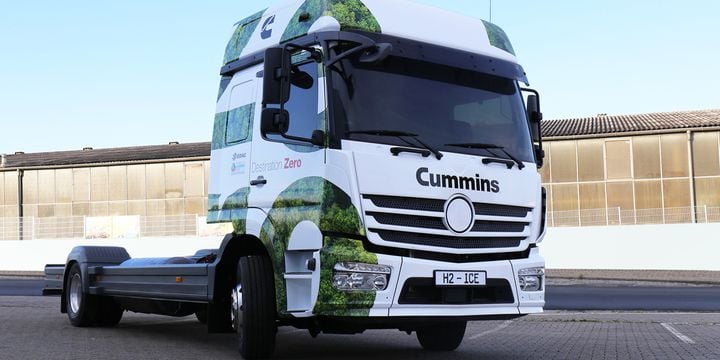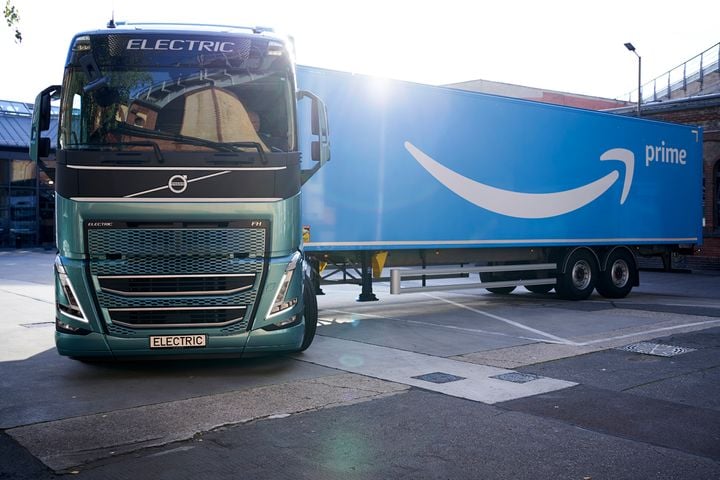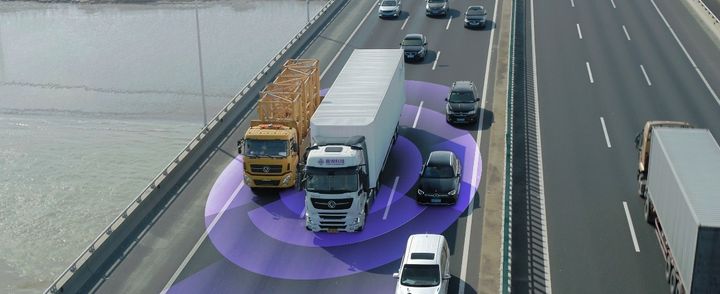Trucker Access › Forums › Diesel News › Global News Roundup: Cummins, Westport Work on Hydrogen Engines – Fuel Smarts
- This topic has 0 replies, 1 voice, and was last updated 9 months, 1 week ago by
 EazyRiDer66.
EazyRiDer66.
-
AuthorPosts
-
May 17, 2024 at 9:15 pm #20930
 EazyRiDer66Keymaster
EazyRiDer66Keymaster

Cummins’ medium-duty concept truck powered by the B6.7H hydrogen internal combustion engine.
Both Cummins and Westport are developing internal-combustion engines fueled by hydrogen, with both companies showing off European demonstrations and concept trucks.
In a joint demonstration between Westport and Scania, early engine test results recorded a 51.5% peak in brake thermal efficiency, complemented by 48.7% at road load conditions, all with engine-out nitrogen oxides similar to the base diesel engine. Those numbers are compatible with Euro VII on-highway and EPA 2027 emissions standards.
The test used Westport’s hydrogen HPDI technology applied to a Scania 13L CBE1 engine platform.
“Hydrogen use in an internal combustion engine with our HPDI fuel system is an affordable pathway to employ a zero-carbon fuel using existing engine architecture and existing manufacturing infrastructure,” said Westport Fuel Systems CEO David Johnson in a press release.
Eric Olofsson, senior technical advisor at Scania, said the hydrogen HPDI concept requires limited redesign of the diesel cylinder head, and no redesign of the external gas exchange system, exhaust aftertreatment system or crank case ventilation system.
“This enables a short time to market with an excellent product associated with low investments and could be a complement to battery-electric vehicles, especially for long haulage and locations with limited electrical infrastructure,” Olofsson said.
Cummins showed off a medium-duty concept truck powered by the B6.7H hydrogen internal combustion engine (H2-ICE) at the IAA Transportation exhibition in Hanover, Germany, this fall.
The H2-ICE conversion highlights the opportunity for truck applications across the 10-to-26 ton gross vehicle weight range to operate on zero-carbon hydrogen fuel with a potential operating range of up to 500 kilometers (about 310 miles).
“While Cummins hydrogen fuel cells offer a highly effective solution for specific applications within the truck industry, our hydrogen engines can also help accelerate fleet decarbonization by offering a lower cost basis using more familiar engine technology,” said Alison Trueblood, executive director of Cummins’ on-highway business in Europe.
The Cummins H2-ICE project used a Mercedes-Benz Atego 4×2 truck, which is widely used for multi-drop distribution. Cummins said the hydrogen conversion work does not compromise truck performance, cargo capacity, or payload.
Cummins noted that the seamless substitution of the diesel engine with the 6.7L hydrogen engine and integration with the existing driveline highlights the ability of H2-ICE to offer a zero-carbon solution for fleets based on a lower cost and a more easily deployable technology path.
Proposed Euro 7 Emissions Rules Criticized as Too Severe
The European Commission, the executive body of the European Union, published its proposal for new pollutant emission standards for cars and trucks. Euro 7/VII would go into effect for trucks and buses starting in July 2027.
The proposed measures aim to bring down emissions from the tailpipe as well as from brakes and tires. The EC claims the new rules simplify the Euro 6/VI regulations they will replace. Euro VII will set limits for nitrous oxide emissions from heavy-duty vehicles for the first time. All vehicles, including electric, will need to comply with brake and tire emissions limits.
In 2035, the EC hopes that the new rules will lower total NOx emissions from trucks and buses by 56% compared to current rules. Tailpipe emissions will be reduced by 39% from trucks and buses.
The proposed rules have been greeted with criticism from the ACEA (European Automobile Manufacturers’ Association), which complained that the standards for heavy vehicles in particular are too severe. Martin Lundstedt, CEO of the Volvo Group and chairman of the ACEA’s Commercial Vehicle Board, warned that over-stringent measures would mean more R&D expenditure on diesel engines and therefore less on electric powertrain technologies.
News Briefs from Around the World
Electric trucks for Amazon: Volvo Trucks will deliver 20 fully electric heavy-duty trucks to Amazon in Germany by year end.

Volvo Trucks will deliver 20 fully electric heavy-duty trucks to Amazon in Germany by year end.
BYD enters European market: BYD Europe BV of Schiedam, Netherlands, the European subsidiary of Shenzhen, China-based BYD Auto Co Ltd, used the IAA Transportation event in Hanover, Germany, to launch two electric trucks, marking its entry into the European e-truck market.
4-Speed Transmission: Eaton debuted an electrified 4-speed transmission for medium- and heavy-duty vehicles for the European market. The gearbox offers flexible gear ratios, improved system efficiency, longer vehicle range and battery life, increased acceleration and grade capability compared with previous generations, according to the company. It’s intended to meet growing demand in several segments, including port drayage, regional and line haul, and vocational applications.
Autonomous trucks in China: Trucks equipped with Inceptio Technology’s Level 3 autonomous “Xuanyuan” system have exceeded 10 million kilometers (about 6.2 million miles) of commercial operation in China.

Trucks equipped with Inceptio Technology’s Level 3 autonomous system have exceeded 10 million kilometers (about 6.2 million miles) of commercial operation in China.
This news was published in the November/December 2022 issue of Heavy Duty Trucking, produced in partnership with UK-based Truck & Bus Builder. Click here for a free trial subscription to T&BB.
-
AuthorPosts
- You must be logged in to reply to this topic.